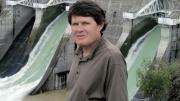The Stockholm Water Prize, known informally as the “Nobel Prize of water,” has been awarded to John Briscoe, visiting professor of environmental engineering at the School of Engineering and Applied Sciences, and visiting professor of environmental health at the School of Public Health. The prize, awarded annually since 1991 by the Stockholm International Water Institute, is given to individuals, organizations, or institutions to "recognize outstanding research, action, or education that increases knowledge of water as a resource and protects its usability for all life."
Briscoe is being honored for his “unparalleled contributions to global and local management of water—contributions covering vast thematic, geographic, and institutional environments—that have improved the lives and livelihoods of millions of people worldwide.” (For an account of his work, and his initiative for teaching students about water-management issues in international development, see “The Water Tamer,” a 2012 Harvard Magazine feature article.) The Institute further praised Briscoe for “providing the world with tools for peaceful, productive, and equitable management of the Earth’s water resources.”
Briscoe received his Ph.D. in environmental engineering from Harvard in 1976, as part of the renowned Harvard Water Program. He returned to the University in 2009 as a professor in the School of Engineering and Applied Sciences, with joint appointments in the School of Public Health and Kennedy School of Government.
King Carl XVI Gustaf of Sweden will present the award to Briscoe at a ceremony in Stockholm on September 4, during World Water Week. A link to the Stockholm Water Prize announcement, including the full text of the citation and a video interview, is available here.









